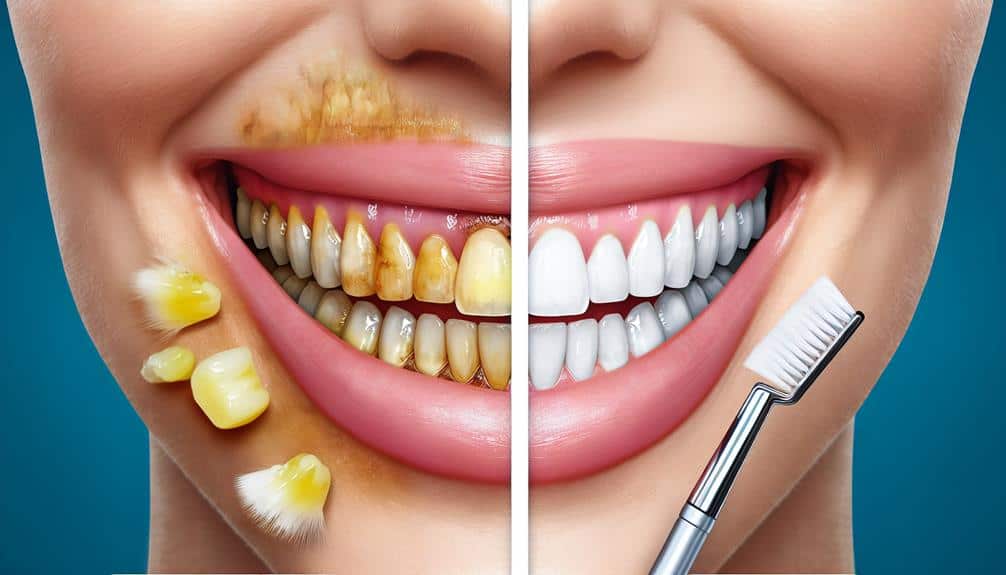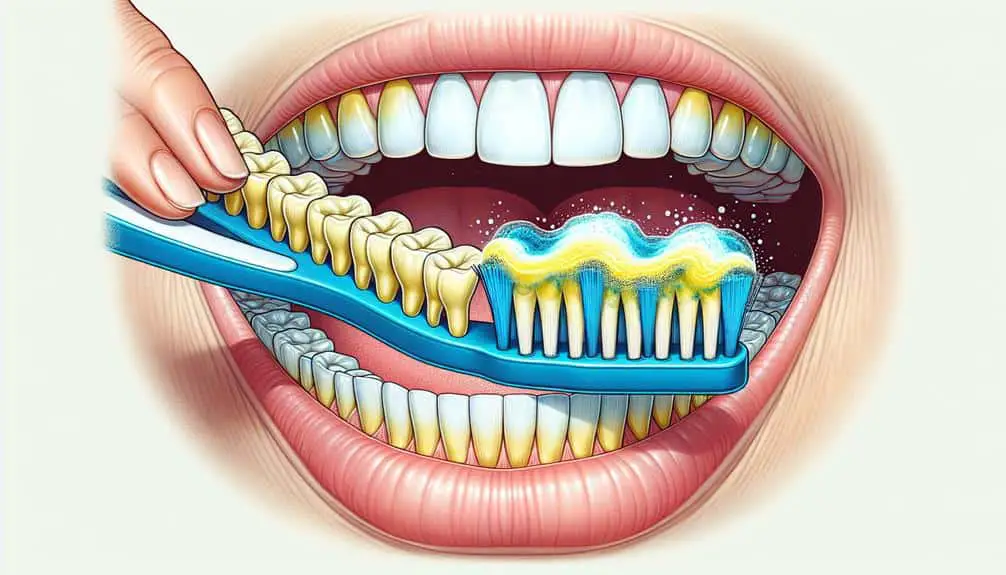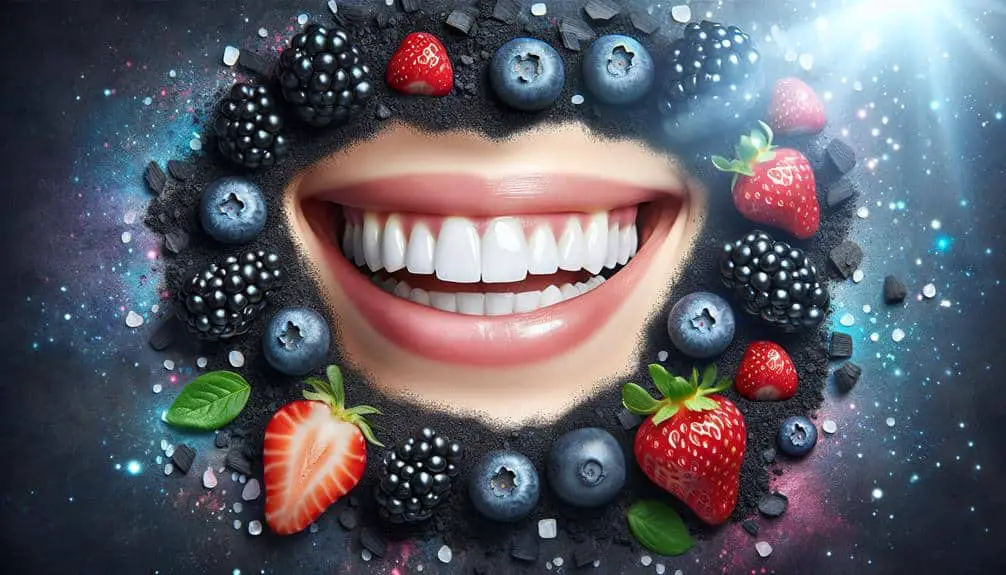To tackle severe fluoride stains, professional whitening treatments offer tailored solutions. Dentists use potent bleaching agents effectively to remove tough stains. Supervised procedures guarantee safety and consistent outcomes. At-home options like hydrogen peroxide kits or activated charcoal pastes can also help. Natural remedies such as baking soda and lemon juice may gently lighten stains. Maintain whitened teeth with regular dental visits, fluoride toothpaste, and whitening products. Prioritize oral hygiene and avoid staining foods for lasting results. Enhance your smile and oral health with these solutions.
Key Points
- Professional whitening treatments with high-grade bleaching agents are effective for severe fluoride stains.
- At-home whitening kits containing potent bleaching agents like hydrogen peroxide can help address tough stains.
- Natural remedies such as baking soda and lemon juice paste can gently exfoliate surface fluoride stains.
- Consistent oral hygiene practices, including using whitening toothpaste, are crucial for maintaining whitened teeth.
- Avoiding foods and beverages that stain teeth, rinsing after consumption, and quitting smoking can help sustain whitened teeth.
Understanding Fluoride Stains
When dealing with severe fluoride stains, understanding the underlying causes is essential for effective treatment. Fluoride stains on teeth are primarily caused by excessive fluoride intake during the tooth development stage, leading to a condition known as dental fluorosis. This condition occurs when the enamel is overexposed to fluoride, resulting in discoloration ranging from white spots to brown stains on the teeth.
Prevention of severe fluoride stains involves monitoring fluoride intake, especially in children whose teeth are still developing. This includes using fluoride-free toothpaste for young children and supervising fluoride treatments to prevent excessive exposure. Additionally, ensuring that children don't swallow fluoridated toothpaste or mouthwash is critical in preventing dental fluorosis.
Understanding the causes and taking preventive measures can help avoid the development of severe fluoride stains. By being mindful of fluoride intake levels and practicing good oral hygiene, you can protect your teeth from discoloration and maintain a bright, healthy smile.
Professional Whitening Treatments
To address severe fluoride stains, one effective solution is through professional whitening treatments offered by dental professionals. These treatments often involve advanced bleaching options that can greatly lighten the appearance of stubborn stains caused by excessive fluoride exposure.
Here are three key points to take into account when choosing professional whitening treatments:
- Tailored Treatment Plans: Dental professionals specializing in cosmetic dentistry can create personalized treatment plans tailored to your specific needs and the severity of your fluoride stains. This guarantees a targeted approach for best results.
- High-Grade Bleaching Agents: Professional whitening treatments utilize high-grade bleaching agents that are more potent than over-the-counter products. These potent agents can effectively break down and remove tough fluoride stains, providing noticeable whitening results.
- Supervised Procedures: Undergoing professional whitening treatments ensures that the procedures are overseen by trained professionals. This supervision not only enhances safety but also helps in achieving consistent and long-lasting whitening outcomes.
At-Home Whitening Solutions
Consider exploring the effectiveness of at-home whitening solutions to address fluoride stains in a convenient and cost-effective manner. DIY methods and home remedies can be viable options for tackling severe fluoride stains. One common at-home whitening solution is using over-the-counter whitening kits. These kits typically contain bleaching agents like hydrogen peroxide that can help lighten stains over time. It's essential to follow the instructions carefully to avoid any potential damage to your teeth or gums.
Moreover, home remedies such as baking soda and hydrogen peroxide mixtures or activated charcoal pastes are often recommended for their stain-removing properties. While these methods can show results, it's important to use them cautiously as they may cause abrasion to the enamel if not used correctly. Consistency is key when using at-home whitening solutions, as results may take time to become noticeable.
Before trying any at-home whitening solutions, consulting with a dentist is advisable to confirm they're safe for your specific dental situation.
Natural Remedies for Stains
For individuals seeking natural remedies to address stains, exploring the effectiveness of home remedies can offer a gentle and holistic approach to whitening teeth. When considering herbal remedies or organic solutions, it's essential to understand the potential benefits they may provide in tackling severe fluoride stains.
Here are some DIY methods and hacks that you can try at home:
- Baking Soda and Lemon Juice: Mixing these two ingredients to form a paste can help gently exfoliate surface stains. The mild abrasiveness of baking soda combined with the acidic properties of lemon juice can aid in brightening teeth.
- Coconut Oil Pulling: Swishing coconut oil in your mouth for about 15-20 minutes daily may help reduce bacteria and plaque buildup, which can contribute to discoloration.
- Strawberries and Baking Soda Mixture: Mash strawberries with baking soda to create a natural whitening paste. Strawberries contain malic acid, which could help lighten stains, while baking soda helps scrub them away gently.
Exploring these organic and DIY methods can be a natural and cost-effective way to address fluoride stains and work towards a brighter smile.
Maintaining Whitened Teeth
Maintaining whitened teeth requires consistent oral hygiene practices and regular visits to your dentist to guarantee long-lasting results. Preventive care is essential to preserve the brightness of your teeth. Brush your teeth at least twice a day using a fluoride toothpaste to prevent new stains from forming. Floss daily to remove plaque and food particles that can dull your smile. Additionally, consider using a whitening toothpaste a few times a week to help maintain your teeth's whiteness.
Long-term results can be achieved by avoiding foods and beverages known to stain teeth, such as coffee, tea, and red wine. If you do consume these items, rinse your mouth with water afterward. Quitting smoking can also help maintain your whitened teeth. Regular dental check-ups and cleanings are vital to monitor the health of your teeth and make sure that your whitening treatment remains effective.
Frequently Asked Questions
Are There Any Specific Foods or Drinks That Should Be Avoided to Prevent Further Staining After Whitening Treatment?
To prevent further staining after whitening treatment, avoid foods and drinks that can cause discoloration like coffee, tea, red wine, and dark sauces. Incorporate dietary restrictions, make lifestyle changes, and follow maintenance tips for long-lasting results.
Can Severe Fluoride Stains Be Completely Removed With Whitening Treatments, or Are They Only Lightened?
You might believe severe fluoride stains will vanish completely with whitening treatments, but alas, they may only lighten. Treatment effectiveness varies based on stain severity. Permanence is elusive; some stains may stubbornly resist removal.
How Long Do the Effects of Professional Whitening Treatments Typically Last for Severe Fluoride Stains?
For severe fluoride stains, the effects of professional whitening treatments typically last long-term with proper maintenance. Follow up care and touch-up options can help sustain the results. Consistent oral hygiene and professional visits are essential.
Are There Any Potential Risks or Side Effects Associated With Using Natural Remedies for Severe Fluoride Stains?
When considering natural remedies for severe fluoride stains, be aware of potential risks and side effects. While some solutions may help, others could irritate your gums or lead to uneven whitening. Consult a professional for guidance.
Is It Possible to Prevent Severe Fluoride Stains From Recurring After Whitening Treatments?
To prevent severe fluoride stains from recurring after whitening treatments, focus on preventive measures like regular dental cleanings and avoiding excessive fluoride exposure. Maintenance techniques, such as using fluoride-free toothpaste, can enhance long-term effectiveness and minimize staining risk.



